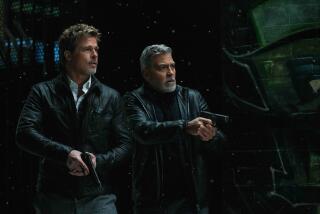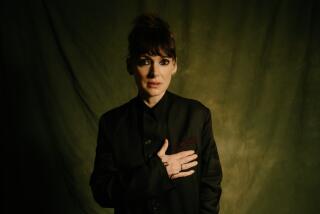The long road to casting the child stars of ‘Moonlight,’ ‘Lion’ and ‘A Monster Calls’
Casting a film is a challenging endeavor in itself, but finding the right child actor for a lead role is especially difficult. In recent films like “Lion,” “Moonlight” and “A Monster Calls,” young actors are at the forefront of the story. It’s the children who shoulder much of the weight in these narratives, each of which is demanding and dramatic, and locating the best person for the roles took a lot of leg work from the directors and casting directors.
“Casting a kid is always a challenge,” says J.A. Bayona, who directed “A Monster Calls.” The film centers on a 12-year-old boy named Conor, played by newcomer Lewis MacDougall, who turns to fantasy to deal with his grief as his mother dies of cancer. That story, based on a book by Patrick Ness, required a very specific actor. “Most kids are not professional actors, so you really need to find someone who fits perfectly,” Bayona notes. “I was looking for a kid who was somehow able to portray all that emotion without being predictable. What Lewis brings to the cast is a sense of rage and this feeling of being angry with reality. He really matched what I was looking for in that sense.”
The process of casting Conor spanned about three months. Casting director Shaheen Baig watched nearly 1,000 self-taped auditions, eventually narrowing the search down to 200 children, both professional actors and unknowns from schools across Britain and Spain. After auditioning the selected 200, Bayona reduced his selection down again. “It was a long audition process,” he says. “At the end we had five very good options and we did a camera test. Lewis was always very special from the very beginning.”
For “Moonlight,” director Barry Jenkins and casting director Yesi Ramirez wanted to cast the young versions of lead characters Chiron and Kevin with local children in Miami, where the film is set. The production distributed flyers and reached out to local schools, hoping to find young actors who understood the community where the film takes place and felt believable within it. “Moonlight” follows a boy coming of age in a poor neighborhood where life is tough and his mother is addicted to drugs — meaning the aesthetic and tone are specific to the city.
The filmmakers held a small open casting and Alex Hibbert, who plays the 9-year-old version of Chiron, who goes by Little, and Jaden Piner, who plays his schoolmate Kevin, both attended with their parents. Neither had any prior acting experience outside of their school theater program.
“I think it’s more difficult to cast children than it is to cast adults,” Ramirez says. “A lot of them, if they have it, they have it — and it’s easier in that sense. But you have to see a lot more kids to find the right one because it’s more about who they are than what their skills are. It’s about who they are and what their natural instincts are. With Alex there was something I started to realize was a common thread between the three versions of the character. It was his eyes. It was something behind his eyes. He was giving us so much more than anyone else had at that point. Alex just stood with how he could convey so much without really saying much.”
Kirsty McGregor, casting director for “Lion” — a true story about a 5-year-old Indian boy named Saroo who becomes lost from his family — wanted to find a child actor the audience would immediately fall in love with. “We needed a young boy who had an inner fire, a beautiful light, who at the same time was not precocious,” she says. “The actor playing little Saroo not only has to carry the first half of the film for the audience, he had to carry the crew though a very long and arduous shoot. That is a huge call for a 5-, 6-year-old boy. We needed a boy with focus, patience and joy.”
That casting process lasted nearly a year. McGregor and director Garth Davis spent five months looking at children in India. Initially, though, they found themselves faced with an unusual hurdle. They wanted a child from a rural area rather than a city but couldn’t cast anyone from a slum because of the visa process in India. That limited which children they could actually audition. They ended up working with a casting director in Mumbai named Tess Joseph, who sent assistants to schools in Mumbai, New Delhi and Pune to tape any child who was interested. In the end, there were about 2,000 tapes, all of which got seen.
“Every day I would be sent about 100-200 new children to watch,” McGregor says. “We gave each kid a color code — red was for kids both Garth and I thought were definitely worth meeting in person, orange was for Garth selects and Blue were for my selects if they didn’t overlap. We narrowed it down from 2,000 to 200 kids and we traveled to India to do callbacks, which was just incredible. I fell in love at least 100 times.”
Sunny Pawar ends up carrying the first half of “Lion,” appearing in every single scene. The crew was impressed by his work, even though he had never acted before. “He had that almost indefinable thing — charisma,” McGregor says. “He could be still. He could listen. The camera loved him. We saw some wonderful children who could ‘act.’ But many of them were very precocious. We needed a child who wasn’t aware of the camera. There is very little dialogue in the first half of the film — we needed someone to hold his own in that space. Someone who would draw the audience into the film.”
There is a delight that comes with watching the right children embody dramatic roles like these, but there is also a concern with whether these young actors can sustain a career after such a project. Ten-year-old Jacob Tremblay did much of the heavy dramatic lifting in last year’s “Room” (and delighted fans throughout awards season with his love for “Star Wars” and his tiny tuxedos). Like with Tremblay — or Macaulay Culkin or Natalie Portman or Haley Joel Osment before him — the right support is necessary to help a child actor prepare and transition into future roles. Bayona, who worked with Tom Holland on “The Impossible” and continues to mentor him as he embarks on his role as the new Spider-Man, feels responsible for his child actors.
“I try to make them understand that to make a film is a unique experience,” the director says. “It’s something professional. It’s not their life. Their life is about school and finishing their studies. Maybe in the future, if they’re lucky, they’ll keep going in this industry and make a living of it. But I want to make them understand what it is they’re doing and what is going to happen afterwards.”
“I love casting children,” McGregor adds. “They have a very different sensibility to adults. They haven’t figured out life yet. They are raw. You have to be very, very careful not to exploit that, but when you find some magic it is an absolute joy.”
More to Read
Only good movies
Get the Indie Focus newsletter, Mark Olsen's weekly guide to the world of cinema.
You may occasionally receive promotional content from the Los Angeles Times.










